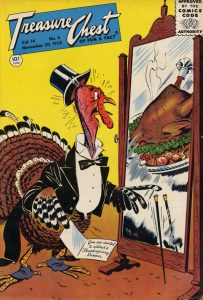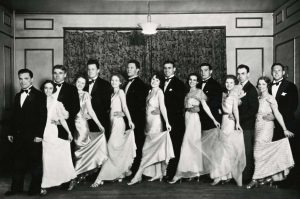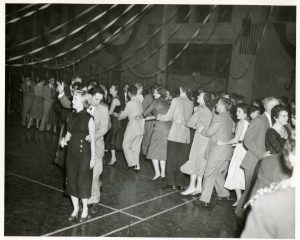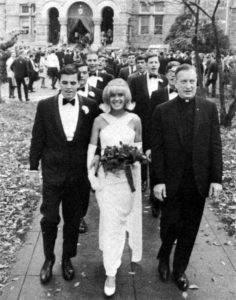
Over the next week, the campus will become rather quiet. Most students and staff will hop on various planes, trains, and automobiles on their way to family and feasts. Many readers may even have their own Thanksgiving traditions from watching football to volunteering at a soup kitchen. But would you spend Turkey Day attending a formal soiree after the big game? If you were a student at Catholic University in the 1920s, and had remained in DC, you may very well have. In fact, if you found yourself on the campus in the 1930s, you may also have witnessed bonfires and parades.
One of the earliest CUA social traditions often centered on Thanksgiving – the Utopian Club Annual Gala. Founded on March 14, 1923, the Utopian Club was one of several men’s social organizations that existed in the early twentieth century at CUA. Among its peers were the Senators Club, the Abbey Club, the Dod Noon Club, and (by 1935) the Cave Dwellers. All these organizations acted as fraternal and alumni societies, organizing formal galas and casual gatherings known as “smokers.”

Within its first year of life, the Utopian Club inaugurated a tradition of hosting an elaborate ball for its alumni and active members, as well as invited guests from the campus community. What began as a simple eventpage 4 in 1923, soon became one of the most anticipated social occasions of the academic year. The student press closely followed the announcements of the Utopian Club’s social engagements, waiting for its elected head, the “Supreme Utopianpage 4,” to announce the Ball’s date, venue, and ticket availability.
While these soirees technically had no fixed date, they were traditionally held in the ballroom of a local hotel on Thanksgiving evening following a CUA football game. Other events, such as the Abbey Club’s Tea Dance were often held the following Saturday. These activities were originally intended to liven up the moods of students who were unable to spend Thanksgiving back home. These dances, as the December 1, 1926 Tower put it, “officially [close] one of the most brilliant weekends that will be written into the historical archives of the C.U. Thanksgiving weekend is always anticipated by those ‘left behind’ for the holiday. Days stuffed with sparkling dances, ardent music, a rousing football game, and dazzling girls, everything to make the existence of the stay-at-home a little easier to endure.”

The Senators Club, an alumni organization, soon began to hold its own Thanksgiving gala alongside the Utopian Club in 1928. By the 1930spage 10, the Thanksgiving galas became closely associated with the Homecoming football game, held during the holiday weekend. Thus, the various social events of Thanksgiving weekend became ever more lively affairs as the 1930s wore on, with celebratory bonfires, jitterbug contests, freshmen pajama parades, and votes to determine the “handsomest man” and the man with the “biggest feet.” With the Tower also reporting multiple visits by motorcycle-bound police and impromptu parades through the Brookland neighborhood, the student population often clashed with the administration and alumni community over what forms of Homecoming spirit were acceptable.

By the 1940s, the Thanksgiving traditions of the previous decades began to fade. The dates of the dances and the Homecoming game itself eventually became movable, though soirees continued for years (and the Homecoming dance never fully vanished). The original founder of the galas, the Utopian Club, continued to thrive well into the 1980s, albeit under a new name. In 1956, in honor of its long-time mentor, Fr. Ignatius Smith, O.P, it adopted the name Sigma Pi Delta. A collection of the organization can be viewed in the Archives.
